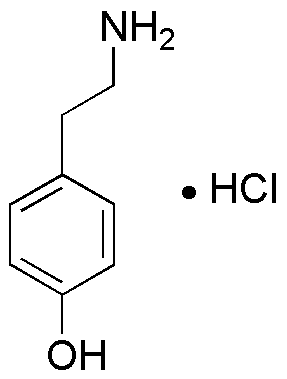Tyramine hydrochloride is widely utilized in research focused on:
- Neuroscience Research: It serves as a neurotransmitter and is used to study its effects on mood and behavior, aiding in the understanding of conditions like depression and anxiety.
- Pharmaceutical Development: This compound is explored in drug formulations for its potential to enhance the efficacy of certain medications, particularly in treating neurological disorders.
- Food Industry: Tyramine hydrochloride is relevant in food science, particularly in the study of fermented foods, where it plays a role in flavor development and food safety assessments.
- Biochemical Assays: It is used in various assays to measure enzyme activity, helping researchers understand metabolic pathways and the effects of different substances on biological systems.
- Clinical Research: The compound is investigated for its role in cardiovascular health, particularly in understanding how it affects blood pressure and vascular function.
General Information
Properties
Safety and Regulations
Applications
Tyramine hydrochloride is widely utilized in research focused on:
- Neuroscience Research: It serves as a neurotransmitter and is used to study its effects on mood and behavior, aiding in the understanding of conditions like depression and anxiety.
- Pharmaceutical Development: This compound is explored in drug formulations for its potential to enhance the efficacy of certain medications, particularly in treating neurological disorders.
- Food Industry: Tyramine hydrochloride is relevant in food science, particularly in the study of fermented foods, where it plays a role in flavor development and food safety assessments.
- Biochemical Assays: It is used in various assays to measure enzyme activity, helping researchers understand metabolic pathways and the effects of different substances on biological systems.
- Clinical Research: The compound is investigated for its role in cardiovascular health, particularly in understanding how it affects blood pressure and vascular function.
Documents
Safety Data Sheets (SDS)
The SDS provides comprehensive safety information on handling, storage, and disposal of the product.
Product Specification (PS)
The PS provides a comprehensive breakdown of the product’s properties, including chemical composition, physical state, purity, and storage requirements. It also details acceptable quality ranges and the product's intended applications.
Certificates of Analysis (COA)
Search for Certificates of Analysis (COA) by entering the products Lot Number. Lot and Batch Numbers can be found on a product’s label following the words ‘Lot’ or ‘Batch’.
Numéro de catalogue
Numéro de lot/série
Certificates Of Origin (COO)
This COO confirms the country where the product was manufactured, and also details the materials and components used in it and whether it is derived from natural, synthetic, or other specific sources. This certificate may be required for customs, trade, and regulatory compliance.
Numéro de catalogue
Numéro de lot/série
Safety Data Sheets (SDS)
The SDS provides comprehensive safety information on handling, storage, and disposal of the product.
DownloadProduct Specification (PS)
The PS provides a comprehensive breakdown of the product’s properties, including chemical composition, physical state, purity, and storage requirements. It also details acceptable quality ranges and the product's intended applications.
DownloadCertificates of Analysis (COA)
Search for Certificates of Analysis (COA) by entering the products Lot Number. Lot and Batch Numbers can be found on a product’s label following the words ‘Lot’ or ‘Batch’.
Numéro de catalogue
Numéro de lot/série
Certificates Of Origin (COO)
This COO confirms the country where the product was manufactured, and also details the materials and components used in it and whether it is derived from natural, synthetic, or other specific sources. This certificate may be required for customs, trade, and regulatory compliance.


